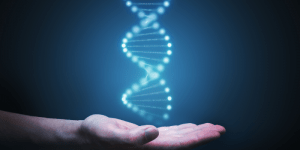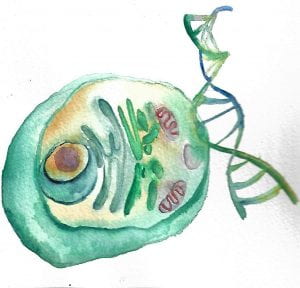
Do we control our genes or do our genes control us?
Our genetics provide the blueprint for all the proteins in our body. Genetics are the ultimate controller of the factors that make us uniquely human and uniquely ourselves. From our genes we develop fundamental personality traits such as opinions and how we behave in society. With so much selfishness, greed, and brutality in our world right now, it invites the age-old question of are people fundamentally good or bad. Are we predestined to behave a certain way, or do we have more control of our life trajectory than we have been led to believe?

It is easy to feel resigned to our fate when we believe that what we are now is all we can ever be. Sometimes the selfishness of humans can be all too much and can feel like meaningful change is impossible. Enter the exciting world of epigenetics. Epigenetics literally means ‘above genetics’ (godlike I know) and it is the ability of our gene expression to change depending on the environmental factors we are exposed to throughout our lifetime. This may not sound that exciting but take a moment to fully appreciate this concept. Our gene expression is not fixed, you can change, the human race can change. So no, we aren’t predetermined to feel prejudice or lack compassion. What has been learned can be unlearned, not just on a behavioural level but on a molecular level too. When it comes to your perceptions you are in the driver’s seat. Take the wheel.
When scientists first discovered the weird and wonderful world of human genetics, they believed they had uncovered the hidden secrets of the human body and would be able to cure humans of all disease and perform other sorts of miracles (think genetically engineered babies!). They hypothesized that for every protein found in the human body there would be one gene that would code for them all. However, when the human genome was finally sequenced scientists found themselves stumped. They found that the number of proteins in the human body far exceeds the number of genes. This discovery upended the world of genetics as we knew it. Charles Darwin was no longer irrefutably right, and geneticists once again had to start from the bottom to build the in depth knowledge of the genetic code we are starting to understand today. The world of genetics was proving far more complex than the clever people in lab coats could ever have predicted.
Are our epigenetics the secret to the climate change crisis? The world is burning, ecosystems disappearing and the most bizarre thing about it is that… not everyone cares. While this idea might boggle the mind of conscientious individuals such as yourself, it seems that most of the human inhabitants of the earth are more interested in the heating of their homes than the heating of the planet. This mindset needs to change if we have any hope of saving our Earth and it seems that the level of empathy an individual expresses, correlates strongly to their willingness to make sacrifices for our planet. Our level of empathy is somewhat pre determined by the genetics passed down from our parents, however with our newfound knowledge of epigenetics we can wonder if perhaps our personality is within our control. I know change right now can seem impossible. But in a world that is uncertain we can rely on one thing. Humans are remarkably adaptable. Perhaps if we can adapt our opinions, lifestyles, and values and all become more empathetic to the environment and each other, we can save the world.
By Daisy Woods.

Categories